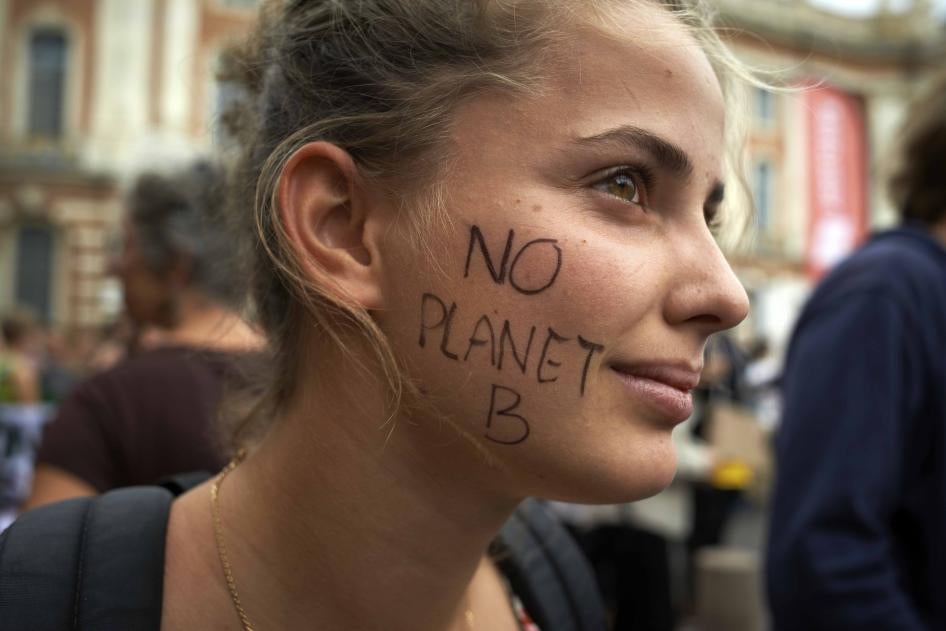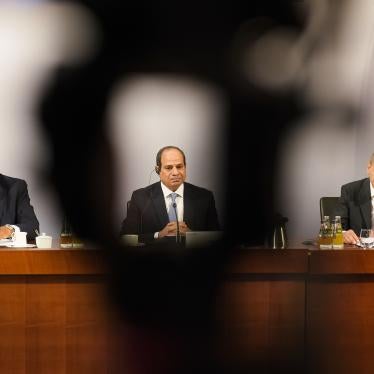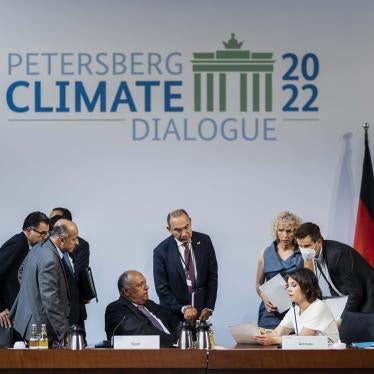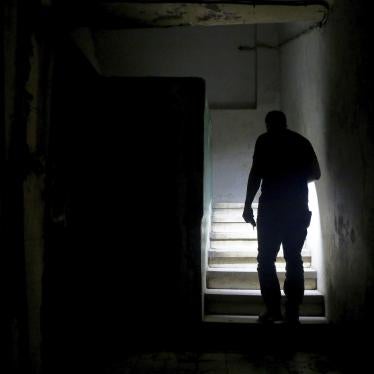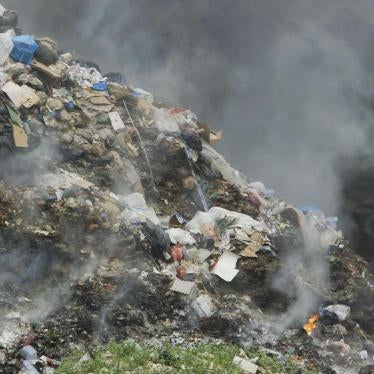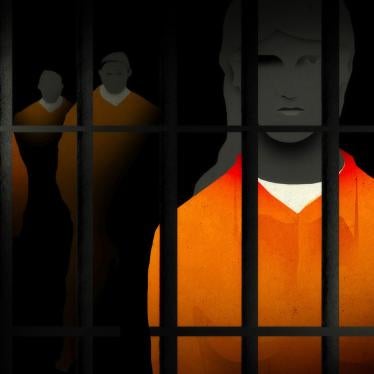2) Why is the climate crisis also a human rights crisis?
3) What are some of the human rights implications of decisions being made at COP27?
4) What are the broad human rights concerns about COP27 being hosted by Egypt?
5) What type of restrictions of civic space could be imposed during COP27?
6) Why has Human Rights Watch described the situation in Egypt as a “human rights crisis”?
8) Why is participation of civil society and Indigenous peoples essential to a successful COP27?
9) What is Egypt’s climate record and what are its current main positions in climate negotiations?
10) Have there been previous climate summits when participation of civil society was restricted?
11) What should the Egyptian government do to enable full and meaningful participation in COP27?
COP27 is the 27th annual United Nations Climate Change Conference. It brings together state parties to the United Nations Framework Convention on Climate Change (UNFCCC) as well as thousands of experts, journalists, and representatives from businesses and nongovernmental groups. COP27, to be held in November 2022, is a forum for states to discuss the rights-based climate actions necessary to enable countries to collectively meet the target of keeping the global rise of temperatures to 1.5 degrees Celsius, in line with the Paris Agreement.
From burning forests to sweltering cities, parched farmlands to storm-battered coasts, the climate crisis is taking a mounting toll on lives and livelihoods around the globe. And unless governments act boldly – and quickly – to massively reduce greenhouse gas emissions, the situation will become unimaginably worse.
In coming years, rising sea levels and massive food shortages threaten to drive hundreds of millions of people from their homes. Climate change aggravates existing inequalities and the impact of the failure to limit greenhouse gas emissions is particularly felt by communities that are already facing serious human rights violations, including Indigenous peoples, older people, people with disabilities, LGBT people, women, children, and those living in poverty. The capacity of states to protect the rights of the most at-risk populations could be severely strained and, in many places, broken.
The ability to avert this dystopian future, affecting today’s children and future generations, will most likely depend, in large measure, on what governments do today to protect human rights. To ensure that elected officials and industry leaders hear public demands for more ambitious climate action, states need to guarantee the rights of people everywhere, especially at-risk groups, and listen to the growing ranks of youth climate activists around the world speaking out about the urgent need for robust and rights-respecting action on climate.
Governments have a human rights obligation to address climate change, including by rapidly cutting greenhouse gas emissions and helping people adapt to the impact of the climate crisis. At this year’s COP, governments should adopt a specific recommendation to rapidly phase out all fossil fuel use and production.
There is growing consensus, including from the International Energy Agency and the Intergovernmental Panel on Climate Change, that for governments to meet global climate targets there cannot be new oil, gas, or coal development. Governments at COP27 should commit to ending authorization for all new fossil fuel projects. In addition, they should end all forms of support, including subsidies and international finance, for oil, gas, and coal developments to rapidly reduce emissions and to limit the human rights impacts of climate change.
Governments should also commit to protecting the rights of communities directly affected by fossil fuel operations, including the people living in and around sites of fossil fuel exploration, production, storage, transport, use, and disposal. Governments should commit to protecting those most at risk and ensure their participation, and representation, in decision-making on climate change.
At this year’s COP, governments should also define the rules for global carbon trading to ensure that they uphold, and advance, the human rights of communities affected by carbon offsetting projects, and establish a grievance mechanism for when these safeguards fail. Further, the decisions on climate finance and adaptation should benefit those who are most affected by the climate crisis and least able to adapt. These decisions should be made in close consultation with these groups, including Indigenous people, older people, and people with disabilities.
Despite the necessary efforts to curb greenhouse gas emissions and adapt to the impacts of climate change, the climate crisis will cause irreparable physical, economic, and displacement-related consequences, or loss and damage. Countries most vulnerable to the impact of climate change, including small island developing states, are pushing for governments at COP27 to establish a finance mechanism to deal with urgent loss and damage.
International and Egyptian civil society groups fear that the severe restrictions imposed by the Egyptian authorities in recent years will hinder the full and meaningful participation of journalists, activists, human rights defenders, civil society, youth groups, and Indigenous peoples’ representatives at COP27. In addition, the Egyptian government could try to use its role as the COP27 presidency to promote an image of openness and tolerance, although political oppression under President Abdel Fattah al-Sisi's government has caused one of the country’s worst human rights crises in decades.
Several informed sources told Human Rights Watch that the Egyptian authorities, through the Ministries of Environment and Foreign Affairs, have, in closed meetings, asked several Egyptian groups to participate in the COP27 events, mostly around “welcome” topics. The UN Framework Convention on Climate Change Secretariat told Human Rights Watch they granted a one-off admission to attend COP27, outside the usual process to be accredited, for over 30 Egyptian groups, all “endorsed” through the Egyptian government.
Protest Space: In an interview with The Associated Press on May 24, Egypt’s Foreign Minister Sameh Shoukry said that his government is planning to designate “a facility adjacent to the conference center” in Sharm el-Sheikh, in the Sinai Peninsula, where the meeting will be held, where activists can hold protests and voice their opinions. He also said that the government will provide participants “access, as is traditionally done on one day of the negotiations, to the negotiating h[all] itself.” Given existing restrictions on protest and assembly in Egypt, which amount to effective criminalization, the foreign minister’s comments imply that the Egyptian authorities will not tolerate protest outside this “government-designated” space.
Reprisals: Even if Egyptian authorities do not impede access or protests during COP27, past experiences suggest that fears of reprisals against Egyptian activists after the COP27 concludes are well-founded. The authorities have prosecuted or otherwise punished, including by travel bans and asset freezes, many human rights defenders and independent journalists for engaging with UN mechanisms and foreign officials, or criticizing the government.
Surveillance and Other Security Restrictions: Given that security forces in Egypt are largely unaccountable and act above the law, the prospect of physical and digital surveillance against participants at COP27 is real. Egypt’s security forces entrap LGBT people on same-sex dating applications and social media. LGBT people are arrested and prosecuted based on digital evidence police find when searching their personal devices, and many face torture in detention. The risk of entrapment and digital targeting against LGBT participants during and after COP27 may be heightened.
When Egypt hosted the African Commission on Human and Peoples’ Rights in April and May 2019, African activists reported a range of abuses, also in Sharm el-Sheikh, where COP27 is being held. Scores of participants reported that the authorities delayed or prevented them from obtaining visas or delayed delivering the badges needed to attend the official summit. Many said they were followed and spied on, and some reported being physically abused by Egyptian security agents. They also said that hotels did not allow them to rent meeting rooms, citing “security instructions”.
Access to Information: Egyptian authorities have, since 2017, blocked access to roughly 700 websites, including the few remaining independent platforms for news media and human rights websites left in the country. The authorities also blocked thousands of websites and texting and calling apps temporarily during events that drew large protests, such as the 2019 street protests. Such massive censorship, coupled with systematic arrests and prosecutions of journalists, has severely restricted access to information and reporting around topics deemed prohibited by the government, including environmental issues.
Since the military forcibly removed President Mohamed Morsy in July 2013, the government of President Abdel Fattah al-Sisi, who was then the defense minister, has relentlessly persecuted critics, dissidents, journalists, and human rights and political activists. The wholesale crackdown on dissent included mass killings of hundreds of largely peaceful protesters in 2013, which most likely amounted to crimes against humanity, as well as the arrest and prosecution of tens of thousands of people on political grounds.
Under the guise of combating terrorism, security agencies, particularly the Interior Ministry’s National Security Agency, have carried out rampant abuses, including systematic, widespread torture and enforced disappearances, all with near-absolute impunity, apparently as part of a state policy to stifle peaceful dissent, most likely amounting to crimes against humanity. The Interior Ministry forces have also killed dozens of alleged terrorists in extrajudicial executions disguised as shootouts. The authorities also have labeled virtually all peaceful dissidents as terrorists and prosecuted hundreds of them before extraordinary emergency, military, or terrorism courts.
Since 2014, under President al-Sisi’s government, Egypt ranked almost every year among the top three worst countries in the world in the numbers of imprisoned journalists according to records of the Committee to Protect Journalists, an international organization that promotes press freedom and defends the rights of journalists. Egypt also ranked as the third worst country in the numbers of executions carried out in 2021. President al-Sisi has issued laws that severely undermined judicial independence. Thousands of people, including children, have been prosecuted in mass trials, in unfair proceedings lacking the simplest resemblance to due process, resulting in lengthy prison sentences and unprecedented numbers of death sentences.
In North Sinai, adjacent to Sharm el-Sheikh, where COP27 is hosted, the Egyptian military and police have committed flagrant abuses and war crimes, including several incidents of extrajudicial executions, as it has battled a relatively small Islamic State-affiliate.
Egypt arbitrarily arrests and detains people based on their sexual orientation or gender identity, and subjects them to torture and ill-treatment in detention, including forced anal examinations. In March 2020, during its third Universal Periodic Review at the UN Human Rights Council, Egypt rejected recommendations by several states to end arrests and discrimination based on sexual orientation and gender identity. Egypt responded that it “does not recognize the terms mentioned in this recommendation,” denying the existence of LGBT people.
Since 2014, Egyptian authorities have intensified restrictions on human rights and environmental groups in one of the harshest government clampdowns in decades, resulting in diminished space for independent organization and assembly.
Increasingly repressive policies have severely curtailed the ability of environmental groups to carry out independent work essential to protecting the country’s natural environment and informing policy making. The groups have faced security harassment and intimidation tactics including arrests and travel bans, creating a general atmosphere of fear.
Restrictions on receiving funding have severely affected human rights and environmental groups. Several laws since 2014, including a 2014 amendment to the penal code, as well as the old and new laws on nongovernmental groups, arbitrarily restrict grants and donations from foreign and national sources.
Increasingly since 2014, the government has prosecuted dozens of independent human rights and civil society organizations, some of them doing environmental work, for receiving foreign funds, and imposed travel bans and asset freezes on leading activists. Such prosecutions have had a chilling impact on these groups.
The government repression has forced dozens of Egypt’s leading civil society activists and groups, including those working on environmental and human rights issues, to leave the country, or to scale down or quit their activism. A number of foreign human rights and environmental organizations have closed their Egypt offices since 2014.
Effective climate action requires more people voicing their opinions and peacefully taking to the streets, not fewer. Robust and rights-respecting climate action requires the full and meaningful participation of civil society, including child and youth activists. This includes those on the front lines of the climate crisis and populations most at risk for the harm of climate change, including Indigenous peoples, people with disabilities, older people, children and young people, women, LGBT people, minorities, and people living in poverty.
Egypt is actively scaling up domestic oil and gas production, use, and export capacity, with plans to become a significant Liquefied Natural Gas (LNG) exporter. Egypt is responsible for over a third of total methane gas consumption in Africa and is the continent’s second largest gas producer, and is making efforts to increase gas consumption in nearly all sectors. While Egypt has updated its Nationally Determined Contribution in July 2022, the Climate Action Tracker still rates Egypt’s overall climate targets and policies as “highly insufficient”. This rating indicates that these targets are not consistent with the Paris Agreement’s objectives, including because Egypt could easily achieve its weak emission targets today without introducing any new policies.
There is a general lack of data and information about many aspects of climate change in Egypt. Egyptian authorities effectively prohibit journalists and advocates inside the country from researching sensitive environmental issues. They are barred from studying the impact on local communities and the environmental toll of fossil fuel operations, including production, refining, and export operations. They are also barred from determining the impact of Egypt’s vast and opaque military business activity, such as destructive forms of quarrying, water bottling plants, and some cement factories, as well as of “national” infrastructure projects such as a new administrative capital, many of which are associated with the president’s office or the military.
At the same time, the government is critical of the Global North and its contribution to climate change and encourages engagement by Egyptian groups around related issues because it intersects with the government narrative and interests while its own policies on climate and environment remain unchecked.
Representatives of civil society and Indigenous peoples have long fought for their right to participate in climate negotiations. For example, at COP25 in Katowice, the Polish government prevented some climate activists from entering the country and searched some of them in their hotel rooms. At COP26 in Glasgow, observers struggled to access negotiating rooms, online and in person.
Egyptian authorities should ease their grip on civic space and uphold the rights to freedom of expression, association, and peaceful assembly to enable a successful climate summit.
The Egyptian authorities should immediately and unconditionally release people arbitrarily detained solely for the peaceful exercise of their human rights or for their religion, gender identity, or sexual orientation. The authorities should also amend domestic laws to bring them in line with Egypt’s obligations under international law. They should repeal or substantially amend laws that unduly restrict and criminalize the exercise of human rights, including Law No.107 on protests, Law No.10 on assemblies, and the 2019 Law on Regulating the Work of Civil Associations, known as the NGO law. The authorities should pledge to uphold the right to freedom of peaceful assembly at all times, including during international events, and refrain from unduly limiting protests to a specific designated area.
- What should United Nations Framework Convention on Climate Change member states and the Secretariat do to press Egypt on ending human rights abuses?
The UN Framework Convention on Climate Change Secretariat should work with the Egyptian government to provide space for diverse civil society participation at the climate talks. This includes ensuring that premises are inclusive and accessible to all, and that observers, including groups critical of the government, have access to registration and negotiations, and are able to protest and express their positions freely.
UN member states attending COP27 should urge Egyptian authorities to end limitations on freedom of assembly, association, and expression and take other meaningful steps to ensure the safe and meaningful participation by civil society. States should recommend concrete, structural reforms to ensure that positive changes endure beyond COP27.
